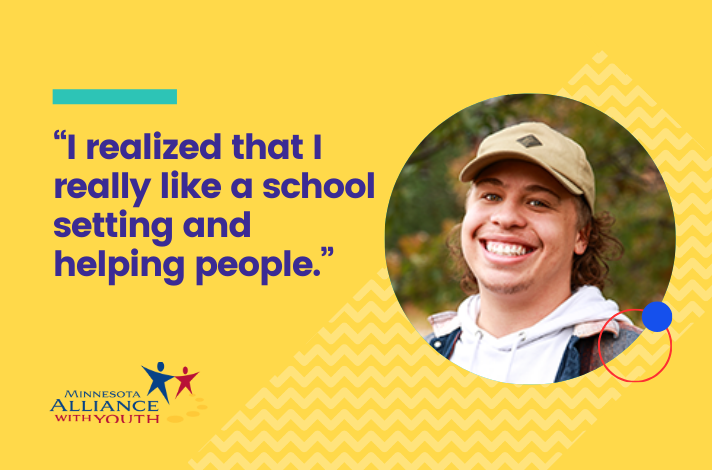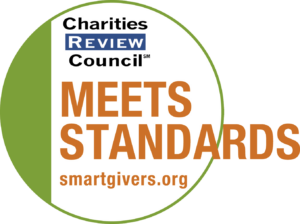In 2023, Nicky (he/him) was re-evaluating his priorities and future plans when a friend connected him with the RISE (Realizing Individual Student Excellence) program at Faribault High School, which provides academic and mentoring support for students. As one of the first two Minnesota Alliance With Youth Promise Fellows to serve at RISE, Nicky found the meaningful opportunity he was looking for — and found his future career in education, too.
Nicky serves in a Promise Fellow position funded through the Youth Mental Health Corps, a national initiative led by the Schultz Family Foundation and Pinterest through which AmeriCorps members support youth mental health and gain skills for careers in behavioral mental health. This year, Promise Fellows received special Mental Health First Aid training and will have access to information sessions from YMHC on careers in mental health.
How did you get connected with AmeriCorps, and why did it feel like a fit for you?
Last year I had moved back to Northfield from Minneapolis, where I’d been in college studying film production but was also struggling with addiction. After I got settled in, I re-connected with Meleah Follen at the Northfield Healthy Community Initiative, who I knew from working with her in the Students Supporting Students program at my high school.
I knew that I wanted to do something that wasn’t a fast-food job or retail — something that would feel like I was making a difference. Meleah thought I would be a good fit for the Promise Fellow role at RISE, and it sounded great to me.
What’s a typical day like at RISE?
During the school year, the other Promise Fellow and I meet with around 34 high school kids weekly, or eight to 10 students each day. We’re academic advisors: We talk with the students about how they’re doing in school, their grades and attendance and things going on in their lives, how they’re doing overall. Some kids come to chat for 10 minutes, some stay a whole hour. Some kids come into the RISE room for tutoring, too.
Helping them manage all that and keeping communication going is the most important thing. We do a lot of listening. The RISE room is a place where kids feel comfortable to go because we’ve built a trusting relationship throughout the year. We also connect students to community resources if they need them. The person who works next to me in the room was helping to connect students with resources every day — there was a student with no housing, another who had no access to food.
Over the summer, the high school students don’t come in, so I’m working with middle schoolers: figuring out field trips, checking schedules, helping out, doing some administrative stuff.
How do students get involved with RISE?
RISE is open to anyone — we serve about 220 kids, or one-fourth of the school population — though there were some students we invited specifically. That included students who were struggling academically, and also kids from different demographics. Our school is majority white, but there are big Hispanic/Latino and Somali populations who don’t always feel heard. We have mentors who speak Spanish and Somali.
Any kids who have behavior issues, who get kicked out of class or written up for talking, we can be the advocates for them — we can work on strategies for behavior so they don’t need a behavior referral or get in trouble.
Are there particular students you think you’ll always remember from this last year?
There are a lot. One student who came to the US from Mexico had transfer credits, but they were all counted as electives, so they had a tough schedule. They came in after school to work on English with me — a really smart student, getting As and Bs and very engaged.
It’s not always serious. I love to make jokes and it’s fun to be around the kids who share that. But sometimes you’ll have a really serious conversation as well. I had a student who had a pretty difficult home life and was failing all her classes. I was able to connect her with the opportunity to switch to an alternative learning center. At first she didn’t want to, but we talked through it and she decided to try. Later, she sent me a message saying, “Thank you, this has helped me so much, I’m passing everything now.”
Being there for students and seeing their success — that’s the reason I want to do this. I’m really proud that we got 90% of our RISE students to graduation this year. Two years ago, the number was more like 67%.
Has your service helped clarify for you what you’d like to do in terms of career or schooling? What’s next for you?
Throughout this year, working with the students, I realized that I really like this setting and helping people. My plans are to teach high school social studies, and wherever I end up teaching I’d also like to help out with the theater department. I love to act and sing and it would be great to share that with students, maybe as a director or music director.
In the fall I’m going to [Minnesota State University] Mankato for a degree in education. I just found out that I got one of the new Minnesota Aspiring Teachers of Color scholarships, plus a Grow Your Own grant that will pay for my housing. With my AmeriCorps education award, I have a lot of money coming my way that I’ll definitely put to good use!
I’ll also be serving another term as a Promise Fellow, this time at Mankato West High School. My role will be different — I’ll have an office in the counselors’ area, although I’ll be working with about the same number of students. It should be a completely new experience, and I’m looking forward to it. The administration seems very energetic and happy that I’ll be there. I’ll be their first Promise Fellow.
Any advice for those wondering if they should give AmeriCorps a try?
What I would say is: DO IT! AmeriCorps is such an important program, and you can serve in any area you want. I have a friend who went to Washington state to help at an elementary school. Another friend went to Maine and built a house. You can do so many things — it really helps you discover what you might want to do someday.
Interested in serving with AmeriCorps? Check out Promise Fellows and our other programs. If you’ve got questions, reach out to our recruitment team!





